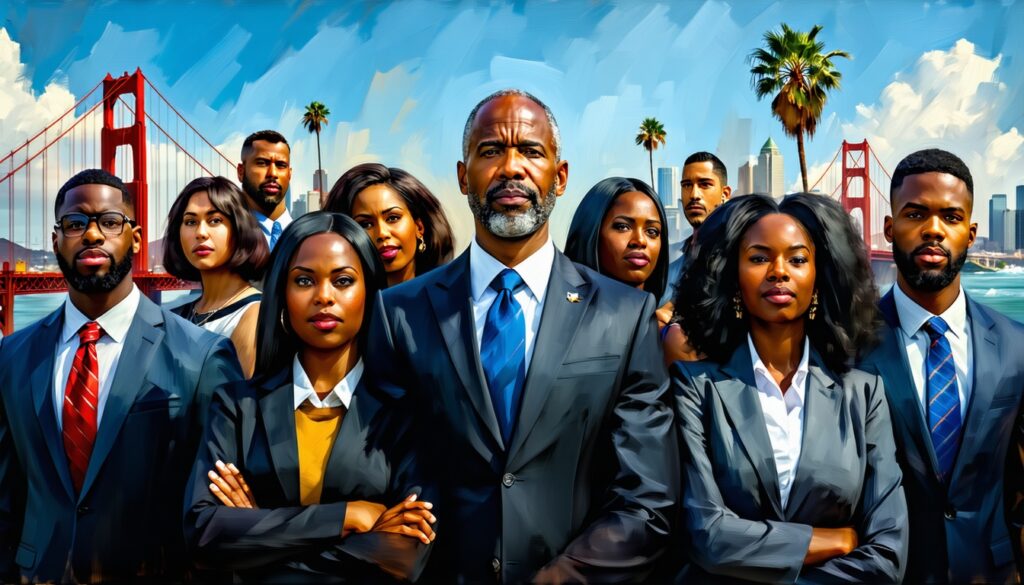
While I weave through the maze of California’s legal chaos, I’m here to shed some light for anyone out there reaching for justice. The world of civil rights law in California is tricky business—you’ve got constitutional rights on one hand and big battles against unfair systems on the other. My role? Standing firm to protect every person’s rights as a dedicated civil rights attorney.
Trust me, my passion for fairness and equality runs deep, fueling my dive into California civil rights. So, tag along as I tackle what’s what in this legal maze—not just to score victories in court but to make sure justice stands tall. Let’s break apart civil rights cases together and get to the crux of legal challenges that make way for justice and equality. Finding the best civil rights attorney isn’t just about legal know-how; it’s also about connecting with someone who mirrors your beliefs and sticks by your side no matter the battle.
I promise this journey is more than legal jargon—it’s about embracing the heart of the fight. Join me, seeing civil rights in California through fresh eyes, where every case proves just how tough the human spirit can be when it comes to demanding change. So, come along on this truth-seeking, fairness-demanding quest as we dance with civil rights law throughout the lively scene in California.
Let’s dive in together, believing that every voice matters, every right needs its shield, and every case deserves relentless dedication from top civil rights champs in California.
- What Does a Civil Rights Attorney Do in California?
- Do You Have a Legit Reason to File a Civil Rights Claim?
- How to Choose the Best Civil Rights Attorney in California
- Why Civil Rights Cases Are Different from Other Legal Cases
- Recent Civil Rights Wins in California
- How Much Does It Cost to Hire a Civil Rights Attorney?
- Your Rights Under California and Federal Civil Rights Laws
- Can You Sue the Government or Police for Civil Rights Violations?
- Filing a Civil Rights Lawsuit in California
- What to Expect During Your Free Consultation
- Frequently Asked Questions
What Does a Civil Rights Attorney Do in California?
In California, civil rights lawyers are like knights for your rights, fighting for justice when things get ugly. If your rights are stepped on, these legal warriors are the folks who’ll help you tread through the mess. So let’s break down what these pros do and how they can help when you’re tangled in a rights mishap.
Types of Civil Rights Cases We Handle
Civil rights lawyers in California are seasoned pros in cases where people face nasty bumps like discrimination or any sort of right-stealing action. Some of the hot tickets we tackle are:
- Discrimination: Smackdown against unfair set-asides due to race, gender, age, disability, or other such reasons.
- Police Misconduct: Calling out cops for going overboard, making unlawful arrests, or trampling on your rights.
- First Amendment Rights: Making sure you can speak freely, practice your faith, and gather without Uncle Sam butting in.
- Employment Discrimination: Standing up for you if you’re treated unfairly at work.
- Right to Privacy: Protecting you from those sneaky eyes spying without a warrant.
Examples of Common Civil Rights Violations
California loves its rights, but sometimes they still take a hit. Here’s where things often go wrong:
- Employment Discrimination: Like missing out on that promotion just because of your age or gender. Not cool.
- Police Brutality: Getting roughed up by officers when it’s just not needed.
- Housing Discrimination: Landlords or sellers giving you the cold shoulder for unfair reasons.
- Free Speech Suppression: Getting penalized for speaking your mind in public.
- Voting Rights Infringement: Barriers put up to keep you from casting your vote.
When to Contact a Civil Rights Lawyer
Feeling your rights have been stomped on or facing discrimination? Don’t wait! Buzz a civil rights lawyer straight away. The earlier you get advice, the better you’re armed for what lies ahead. Reach out for a free chat and we’ll map out the best way to tackle what you’re up against.
Knowing your rights is just part of the battle; getting a sharp civil rights attorney in your corner is what makes the justice dream work. They’ll guide you in keeping your liberties intact in California.
Do You Have a Legit Reason to File a Civil Rights Claim?
If you’re feeling like your civil rights hit a snag, before you go full steam and get the legal gears turning, you need to figure out if you’ve got a solid case. Knowing how to spot when your rights are being stomped on, what that looks like in sunny California, and getting your ducks in a row before you start the legal tango can make this dance a lot smoother.
How to Tell if Your Rights Took a Hit
Catching a whiff of a rights violation means knowing the rights written in stone for you to enjoy. Think about the obvious flags like getting the short end of the stick because of how you look, what you believe in, or how you roll if you’re disabled. If someone in a badge messed with you, your boss crossed a line, you’ve been put in the back of the bus when you shouldn’t have been, or someone clipped your wings to speak your mind – these are times to raise your eyebrows. If it feels like someone’s stepping on your toes, don’t sit on it, find a legal eagle.
What’s Happening in California’s Backyard?
Right here in California, you’ll find all sorts of ways rights get trampled. Think about folks not getting hired because of their skin tone, or cops roughing folks up unjustly. Maybe someone spied on you when you thought you had your privacy or tried to hush you when you were speaking on a peaceful corner. Just like a puzzle, seeing these clear pictures helps you see where you might be a piece.
What to Do Before You Sound The Alarm
Before you throw down a rights claim, there’s a bit of a checklist you want to tick off. Start with grabbing any proof you can, keep track of what happened, if someone saw what went down or if you have it on tape, even better. Chat with someone who knows the ropes – a civil rights lawyer – they can tell you if it’s worth the hassle. You might even settle things without the courts getting involved. Being sharp and ready is half the win.
Feeling a bit lost at sea? Maybe you’re not sure if your claim’s worth its salt, or maybe you just need a hand to hold. A savvy civil rights lawyer can give you golden advice suited just for you. To have all the ins and outs on civil rights cases, and how the gavel might swing in California, check out our deep dive on filing a civil lawsuit in California.
Knowing your rights and when they’re getting stepped on, especially in the wild west of Californian law, lets you stand tall and go after what’s rightfully yours. By tuning into your gut, spotting the dodgy moves, and getting your game plan down, you can face the legal hustle with your head up and a clear path ahead.
How to Choose the Best Civil Rights Attorney in California
Picking the right lawyer for a civil rights case in California might just be the most important step you take. What makes one attorney stand out can be what clinches the deal for your claim. Here’s what you need to keep in mind.
Qualities in a Lawyer That Matter
Looking for someone to represent you in a civil rights case? You gotta ensure they’ve got the chops. Keep an eye out for these must-have traits:
Experience: A lawyer who’s been around the block with civil rights cases will have a winning track record. They’ll be handling your case like a pro, guided by rich experiences from past victories.
Empathy: It’s not just about lawyering; it’s about caring. A lawyer who truly gets your situation and sincerely fights for you can make all the difference.
Communication Skills: They need to talk the talk you can understand. If your lawyer can’t explain legal gibberish in plain language, that’s a red flag.
Questions to Ask Before You Hire
Before you shake hands and sign on the dotted line, pepper potential lawyers with some direct questions. Here are a few basics to help you size up their suitability:
Case Experience: Get the scoop on their history with cases like yours. Ask about wins and noteworthy settlements.
Case Strategy: How do they plan to win your case? What’s the game plan, and how long’s it gonna take? You want to know the play-by-play.
Communication and Accessibility: You need to know how open they’ll be with information about your case. When will they be available and how often will you hear from them?
Asking these will quickly show you if the attorney feels like the right fit—or if you need to keep searching.
How State and Federal Court Experience Comes into Play
Civil rights battles in California can bounce between state and federal courts, so you need someone who knows their way around both. Here’s why court experience is crucial:
Knowing the Ropes: They’ll be adept at all the nitty-gritty rules of both courts, making the process smoother.
Crafty Strategies: With knowledge of both court systems, they can plan sophisticated strategies to support your case.
Adaptable Tactics: Experience in various settings means they’ll tailor their approach to fit whichever court your case ends up in.
An attorney with comprehensive experience in state and federal courts gives you a significant leg-up in pursuing your civil rights claim.
Securing a top-notch civil rights attorney in California isn’t just about picking someone with fancy credentials. It involves carefully evaluating their background, how they handle cases, and their experience with courts. Focusing on these factors ensures you’re in capable hands as you fight for justice.
Why Civil Rights Cases Are Different from Other Legal Cases
Civil rights cases have a unique flavor compared to other legal disputes. Getting what’s going on with these is crucial, especially if you’re tangled up in a California case.
The Role of Government Folks
In these cases, the government often plays the bad guy. We’re talking about accusations of officials or agencies stepping on individual rights. Whether it’s a city office, the whole state, or Uncle Sam himself, these lawsuits claim someone’s constitutional toes got stepped on. Wrangling these government groups involves knowing the ropes of administrative red tape, understanding how to hold them accountable.
Filing and Handling Civil Rights Lawsuits
Over in California, civil rights lawsuits take a different trail than your average legal spat. Picture a hefty load of research, papers, and legal nitty-gritty just to say someone crossed a line. You’ve got rules and deadlines stacked up all official-like. A lawyer who knows their way around civil rights quirks can be your best compass through this mess.
The Burden of Proof Adventure
Here’s the real kicker—it’s on the person filing the suit to prove’n an actual rights mix-up happened. And not just that; they gotta show it was unfair or downright unconstitutional. You’ll need rock-solid evidence and solid arguments to win the day. This proving game is a tougher nut to crack than in other types of cases, making it so important to have a sharp lawyer holding your hand through the process.
Wading through the peculiarities of civil rights cases in California ain’t a walk in the park. It’s about understanding who’s pulling the strings in the government, mastering the filing challenges, and climbing the steep hill of proving your case. Having a savvy civil rights lawyer in your corner could make all the difference when it feels like your rights are on shaky ground.
Recent Civil Rights Wins in California
Hey there! Let’s chat about some recent wins from the civil rights powerhouse attorneys here in California. These legal eagles are protecting the rights of folks from all kinds of unfair treatment. Here’s a breakdown of some of the most impressive wins they’ve snagged lately:
Police Misconduct and Excessive Force Smackdowns
Some law enforcement folks might’ve thought they could get away with bad behavior, but not on these lawyers’ watch. They’ve managed to haul in hefty settlements after taking on cases with police misconduct and using too much force. This isn’t just about the cash—it’s about making sure that those on the wrong side of justice pay up for causing pain and distress. Justice doesn’t just knock—it kicks down doors!
Wrongful Arrest and False Imprisonment: Stories of Vindication
Imagine being nabbed for something you didn’t do. Scary, right? Thank goodness these smart lawyers are around! When innocent people get tossed in jail for no reason, these attorneys jump in. They’ve tackled cases where folks were unfairly locked up and got them off the hook. Finally—freedom and a pat on the back for their legal saviors.
Tales of Discrimination and Harassment Knockdowns
California prides itself on diversity, but discrimination still worms its way in sometimes. Be it race, gender, or who you love—everyone deserves fair treatment. When someone gets bullied or put down because of who they are, these attorneys are ready to fight. They’ve been knocking down biases, one case at a time, and scoring wins for their clients.
These action-packed civil rights wins show how crucial it is to have dedicated lawyers on your side. They’re not just fighting cases—they’re standing up for freedom and taking down the bullies one by one. In California, it seems like these attorneys are on a roll when it comes to leveling the playing field and keeping everyone in line. Go team!
How Much Does It Cost to Hire a Civil Rights Attorney?
Diving into the world of legal battles in California can feel like a long trip down a winding road, especially when cash and coin come into play. If you’re looking to stand up for your civil rights, knowing the cost of waving your legal sword is a big piece of the puzzle. Lawyers, much like barbecue pros with their secret sauces, have varied ways they charge. It’s time to size up those costs and what happens when you bring a civil rights lawyer onto your team.
Fee Structures in Civil Rights Cases
In the wild west of California’s legal scene, civil rights attorneys bring out two main moneymaking tricks: contingency fees and hourly rates.
| Fee Structure | Description |
|---|---|
| Contingency Fees | This one’s a bit of a gamble. The lawyer gets paid from whatever you win. Think of it as a ‘you win, I win’ deal. No pocket digging needed upfront, making it easier for folks to take their stand in court. |
| Hourly Rates | Here, you’re on the clock. The lawyer, and maybe even their helper elves, clock hours and you foot the bill for those hours. What you’ll pay can swing up or down depending on the lawyer’s street cred and the plot twists of your case. |
Contingency vs. Hourly: What to Expect
When it’s time to bring a civil rights lawyer on board in California, it’s all about the money talk. For those pinching pennies, a contingency fee might seem like a sweet deal—no cash line-up needed. It’s a manageable route for those shut out by the usual upfront lawyer costs.
Hourly rates, though, might suit a case that’s like an unscripted drama, with its twists and turns hard to see coming. Grasping the fine print of your lawyer’s price tag lets you play it smart when choosing how to march into your legal battle.
When You May Not Pay Anything Upfront
Many folks don’t spend a dime when jumping into a civil rights case under a contingency deal. This setup clears the way for voicing your grievances in court without worrying about paying a lawyer before the gavel drops.
Tag-teaming with a civil rights lawyer who runs on contingency means pushing forward for justice without your wallet getting lighter right from the get-go. Just make sure to chat about the financial nitty-gritty with your lawyer. Understand what’s what with the payments so there are no surprises lurking later.
Your Rights Under California and Federal Civil Rights Laws
Living in California and navigating civil rights issues isn’t just about knowing laws, it’s about understanding protections available to you, especially when things go sideways. Diving into California’s civil rights laws alongside the Constitution, you gain a sharp grasp of your legal shield and what’s got your back.
Key Laws That Protect Your Civil Liberties
Both federal and California state laws are your buddies, standing guard over your civil rights. Here’s the big guns:
| Law | Description |
|---|---|
| Civil Rights Act of 1964 | Outlaws discrimination due to race, color, religion, sex, or national origin. |
| Fair Housing Act | Promotes fair housing conditions and aims to eliminate bias in housing. |
| Americans with Disabilities Act | Defends those with disabilities from being treated less in various public arenas. |
Knowing these laws is like having a flashlight. You can spot civil rights issues and start reclaiming your rights.
How California Civil Rights Laws Are Unique
California doesn’t just follow the federal playbook. It throws in extra safety nets for you. These added protections mean you’ve got more room to maneuver and bounce back if faced with discrimination, harassment, or any other nonsense. Grasping these California-specific quirks turns you into a savvy navigator.
The Role of the Constitution in Civil Cases
The U.S. Constitution is your best ally – it’s the bedrock where civil rights find their roots in America. It assures everyone gets a fair shake, protects basic freedoms, and when civil rights hiccups happen, its principles often light the path for legal arguments and the hunt for justice.
Linking up California and federal directives with the Constitution helps you become a proactive rights warrior. If you feel your civil rights have been stepped on, chatting with a wise attorney can set you on the right path. A good lawyer doesn’t just talk the talk, they’ll tailor advice to fit your story.
Can You Sue the Government or Police for Civil Rights Violations?
Getting to grips with civil rights tussles involving the government or police can feel like wading through a legal swamp. But don’t worry—I’m here to help you navigate it all. We’ll dive into qualified immunity, when you might actually pin some blame on public agencies, and what it takes to get a government tort claim rolling in California. Sound like a lot? Trust me, it’s not as bad as it seems.
Breaking Down Qualified Immunity
Qualified immunity is like a super-power vest for government folks, including cops, making them mostly untouchable personally for constitution goofs on the job. This rule tries to keep the silly lawsuits at bay while still making sure officials pay up for the real duds. Curious about how this might mess with civil rights claims? You can find the lowdown here.
When You can Go After Public Agencies
Yes, qualified immunity can make it tricky to pin the blame on government figures, but it’s not a get-out-of-jail-free card for every public agency. In some cases—think widespread discrimination or turning a blind eye to constitutional missteps—these entities might still end up in the hot seat. Knowing when you can launch a lawsuit against public agencies is key to fighting civil rights battles. Need more details? Check out our deep dive on filing a lawsuit against public agencies.
Filing a Government Tort Claim in California
Before shouting lawsuit in California’s direction, you’re usually required to file a little something called a government tort claim. It’s like giving the state a heads-up, maybe even a chance to make things right before you drag them to court. Don’t miss the specific quiz notes and due dates that can make or break your claim. For the ins and outs of filing this claim, snag our helpful guide here.
By brushing up on how to sue the government or police over civil rights issues, you’ll be better sorted to tackle the courtroom chaos and rally for your civil liberties. Get to know the ropes of qualified immunity, the potential to sue public agencies, and the full shebang for filing claims in California—it’s crucial if you’re aiming to rise for justice and safeguard civil rights.
Filing a Civil Rights Lawsuit in California
Filing a civil rights lawsuit in California might feel like trying to crack a tough nut. But once you know the drill, you can make sense of the steps, deadlines, and what it generally takes for these cases to wrap up.
Step-by-Step Overview of the Process
Where It All Begins: First, you experience a violation of your civil rights. This could be your good old discrimination or even ugly police misconduct.
Chat with an Attorney: Find yourself a civil rights attorney in sunny California and lay your cards on the table. In this first pow-wow, they’ll check if your case stands a chance or not.
Gearing Up for Battle: If the attorney’s on board, they roll up their sleeves and start digging—collecting evidence, chatting with witnesses, drafting a battle plan. This is the meat and potatoes of your case’s success.
Bringing It to Court: Your attorney will put together a formal complaint, laying out what went wrong and what you’re hoping to get out of it. This paperwork kick-starts the whole legal jazz.
Swap Meet Time: In the discovery phase, it’s all about showing your cards. Both parties sling evidence back and forth—documents, witness chatter, and expert takes.
The Art of the Deal: Before heading to trial, there might be attempts to iron things out through a friendly chat. Any settlements could spare everyone the courtroom drama.
The Main Event: No deal? Then it’s showtime in court. Your attorney’s there to strut their stuff, laying out evidence and witnesses before a judge or jury.
Let’s Hear the Verdict: The verdict’s in the hands of the judge or jury, who will weigh the evidence and decide if you’ve been wronged. If you win, the court decides how to set things right.
Deadlines You Gotta Know
Watch the clock in California—civil rights lawsuits have specific deadlines, aka statutes of limitations. Miss these deadlines, and your case may be thrown out, so keep them in mind as you move forward.
How Long Will This Take?
How long’s a piece of string? It depends. With court schedules, case stickiness, and how feisty both sides are, it can vary. Sometimes you get a quick wrap-up, other times you’re in for the long haul, with trials stretching months or years.
Sorting through these steps, keeping an eye on deadlines, and having a sense of the timeline help you manage your expectations. Teaming up with a practiced attorney in California could give your case the boost it needs. Pull it off, and you’ll be savoring that sweet success by the end of it all.
What to Expect During Your Free Consultation
Thinking about lawyering up for your civil rights case? That first chat, the all-important free consultation with a civil rights lawyer, sets the stage to sort out your situation and lay down some game plans. Let’s break down what you’ll go through in this initial meet-up:
What Documents to Bring
To squeeze the best out of your consultation, come packing with all the paperwork linked to your civil rights saga. Think along these lines:
- Reports from any incident
- Emails and letters with the folks involved
- Witness write-ups
- Legal papers you’ve been handed
- Snaps, videos, or any other kind of proof
Having these in your back pocket helps the lawyer dive into your story ASAP.
How Your Case Will Be Evaluated
In the meeting, the lawyer lends an ear to the events that got you to this point. They’ll be throwing a bunch of questions your way to really get the nitty-gritty of your issue and see if your claim holds legal water. The lawyer then sizes up your situation, lays out some possible battle plans, and maps out what happens next in the legal hustle.
What Happens After You Contact a Lawyer
After your sit-down, the lawyer will mull over the info you’ve dished out and figure out if they’re your legal match. If they think they’ve got what it takes to tackle your case, they’ll chat through their plan of attack, potential outcomes, and what the costs might look like. You’ll get the chance to hit them up with questions about the whole deal and clear up anything on your mind before teaming up.
This first meet is your gateway into the legal arena, giving you the lowdown on your rights, checking out legal options, and figuring out if chasing your civil rights claim makes sense. If you’re ever stuck or confused about civil rights or scoring legal help, don’t hesitate to give Law Karma a shout. They’re there to help you navigate the storm.
Frequently Asked Questions
When it comes to civil rights issues, questions can pop up like mushrooms after a rainstorm. Here are some of the most common ones folks in California seem to ask:
How much does a civil rights attorney cost?
Figuring out the cost of a civil rights attorney in California isn’t a one-size-fits-all deal. Prices can bounce around based on how tricky your case is, how seasoned your attorney is, and how you decide to pay up. Most of the time, civil rights attorneys work on contingency (they get paid if you win) or by the hour. Need the nitty-gritty on attorney fees? Check out our article on reasonable attorney fees in California.
What is considered a violation of my civil rights?
A civil rights violation is like someone stomping all over the rights that law seals away for safekeeping. It might look like someone discriminating against you because of your skin color, gender, religion, or other stuff that’s supposed to be off-limits; not letting you access services others can freely get to; or law enforcement packing more punch than they should. Getting cozy with the laws that guard your civil liberties is key to spotting when someone crosses the line.
How do you prove a civil rights violation?
Proving someone trashed your civil rights isn’t just waving your arms and shouting out. You need solid evidence like documents, what witnesses saw, videos, or anything that backs up your story of rights being messed with. Knowing the ropes about burden of proof and how a civil rights lawsuit is filed can beef up your case. Need more insight? Head over to our article on how to file a civil lawsuit in California.
Can you sue for harassment in California?
Absolutely, you can take someone to court for harassment in California. Whether it’s on the job or somewhere else, legal paths are open for those who face discrimination or harassment. Getting clued into how to file a harassment complaint is a big step in dealing with such issues. Dive into our article on how to file a harassment complaint in California to learn more.
Who pays for a civil lawsuit?
Typically, if you’re the one raising a ruckus in a civil lawsuit (the plaintiff), you’re also the one expected to cover the legal bill. But in civil rights cases, attorneys often roll with contingency payment, meaning their paycheck comes if you get a win in court. Knowing about fee setups in civil rights wrangles can help you get your financial ducks in a row.
What is a civil rights violation worth?
Deciding just how much a civil rights violation is worth can look like a complex math problem. It hinges on the unique twists of your case, how severe the damage is, and a handful of other details. You might see compensation like cash for financial loss, emotional bruises, punitive damages, and covering attorney fees. Chat with a civil rights attorney to pin down what your case might fetch.
These questions are a starting line for folks in California to wrap their heads around their rights and the legal maze of civil rights matters. Remember, chatting with a civil rights whiz can make sure you’ve got the right support to keep your rights sturdy and respected.






